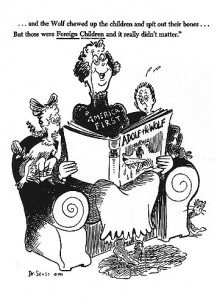Amanda Marcotte describes what the past 24 hours have felt like for me, too:
Relief, elation, concern about the future, urge to make dark jokes, rush of memories of 9/11, glee, concern about myself for being so bloodthirsty, telling myself that it doesn’t count when the person killed was such a horrible piece of s—, a resurgence of grief about 9/11, more dark jokes, annoyance at people scolding those making jokes on Twitter for not seeing that humor has its place even in serious times, feeling bad for John King’s obvious predicament of having to be pulled away from having a night on the town in order to report on this, schadenfreude watching wingnuts scramble to find a way to rationalize this so they can find anyone to credit but Obama (even though he clearly ordered it), amazement watching people pour into public spaces on TV to celebrate, mild concern that this could be a problem, realizing no one is actually going to care, trying to imagine what it must be like to be the guy who pulled the trigger, grief that this world can be so dark, irritation at being scolded by well-meaning folks for being glad, and finally some serious thoughts about what all this means.
James Fallows on President Barack Obama’s speech:
I was more impressed by the craftsmanship and necessity of most parts of the speech. We will discuss this for a long time, but on short notice this was an effective presentation of both details and theme. The tone, which was sober rather than exultant, was also appropriate.
Bin Laden’s death will impact the debate about the war in Afghanistan. … The beginning of the troop withdrawal is already set for this summer, but calls for a more intense and rapid draw-down will only increase. Of course, there will be a serious — and political — debate about what the future U.S. policy toward Afghanistan (and Pakistan, too) should be, especially given that it’s hard to believe Pakistan somehow overlooked bin Laden living in an affluent military veteran suburb of Islamabad. In fact, because of Pakistan’s questionable reliability as an ally, it complicates the picture with Afghanistan and doesn’t make “declaring victory and coming home” such a cut and dried decision. …
James Fallows on the opportunity this presents:
Here is potentially the greatest significance of this news, apart from the “bringing justice to our enemies” satisfaction: it holds the potential of marking an end to the otherwise un-endable “Global War or Terror.”
Signifying an end to a “global war” does not mean the end of a threat. America faces a daily threat from crime; for the foreseeable future Americans and others will face a continuing threat of terrorist attack; the entire world faces a threat that the thousands of nuclear warheads still in existence could destroy millions, through accidental or deliberate misuse. But we classify all those as threats, requiring our continued vigilance and best efforts to prevent them. Rather than as ongoing, open-ended wars with the consequent distortions that wars can impose on our values, institutions, and public lives.
As long as the “Global War on Terror” was defined as eliminating all threat of terrorist activity, it could never be ended. That threat — like other threats — will never completely go away. But if this admittedly symbolic victory in the “war” can be taken as closing a loop opened ten years ago (and earlier, with previous OBL-inspired attacks), perhaps it could free us to continue the vigilance while beginning to correct the decade-long warping of our values.
Juan Cole on bin Laden as “a dinosaur, a relic“:
The Arab Spring has demonstrated that the Arab masses yearn for liberty, not thuggish repression, for life, not death and destruction, for parliamentary democracy, not theocratic dictatorship. Bin Laden was already a dinosaur, a relic of the Cold War and the age of dictators in which a dissident such as he had no place in society and was shunted off to distant, frontier killing fields. The new generation of young Arabs in Egypt and Tunisia has a shot at a decent life. Obama has put the US on the right side of history in Tunisia, Egypt, Syria and Libya (where I see crowds for the first time in my life waving American flags). People might want a little help from a distance, but they don’t want to see Western troops deployed in fighting units on their soil.
Most of what changed in this country after 9/11 was our choice, not his. And his death is a reminder that changing it back — or revising it to better fit our future — is, similarly, our choice, not his. We’ve killed him, but we haven’t revisited the ways in which he changed us, or the ways in which we changed us in response to his attack. Maybe it’s time we did.
Bin Laden understood from the beginning that his tiny group of murderers would never be able to destroy the United States. Instead, he would destroy America from within by luring us into unwinnable wars abroad and exploiting fear to warp America into the weak, skittish tyrant he always believed us to be.
Just as al-Qaida could never defeat the United States militarily, the biggest threat to its ideology was never just American force but Muslims’ own desire for self-determination. It is fitting that bin Laden’s end should come now, while the Arab Spring brings the reign of less imagined despots to a close. As they usher in their new democracies, we should consider what we’ve done with ours.












